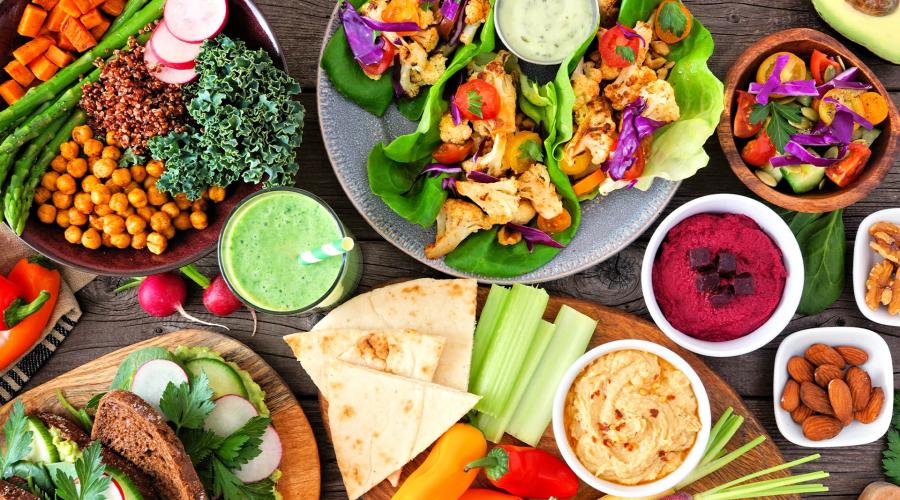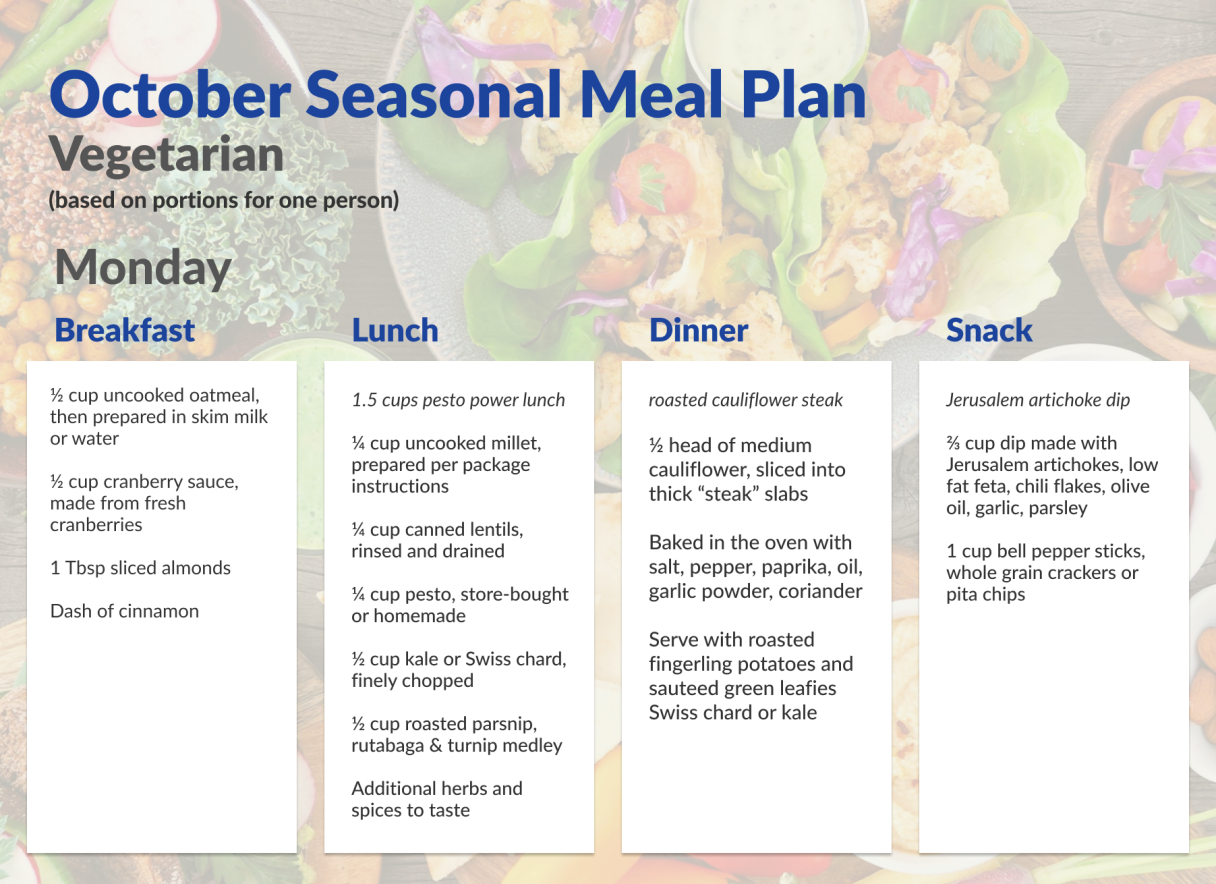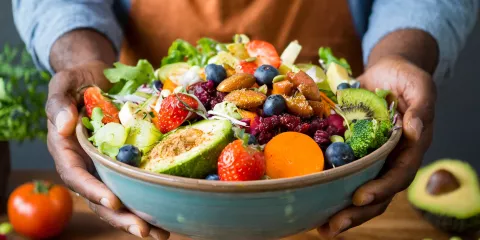
Meal Plan Created By: Amanda Kostro Miller
Have you ever considered going green? We’re not talking about riding your bike to work or adding solar power to your home, though those are also excellent things to try out. We’re talking about eating green, that is, going vegetarian! Trying out a vegetarian diet for a short time is a great way to incorporate new foods into your diet.1 To help keep your diet healthy and full of fun new fruits and veggies, we’ve partnered with a Registered Dietician to give you 12 months of healthy eating, with handy cheat sheets, meal plans, and tips to help you eat healthy, easily.
ICYMI: 12 Months of Healthy Eating: Superfoods
This month, we’re talking veggies. Our meal plan is all about vegetarian dishes, since October is vegetarian month! When a vegetarian diet is well-planned out and balanced correctly, it can have substantial health benefits.2 If you’ve never tried eating vegetarian, it might seem daunting, but we believe in you! There are more fruits, veggies, legumes, and other delicious non-meat foods than you can even imagine, and you’re bound to find something you like. That’s why we built a delicious vegetarian meal plan with lunches, breakfasts, snacks, and dinners with the help of a registered dietician. Try our 7-day vegetarian meal plan today!
Download The Printable Meal Plan
Why Do People Go Vegetarian?
Vegetarians are often portrayed in the media as weird, counter-culture types with a vendetta against meat and a commitment to an alternative lifestyle. While eating vegetarian certainly doesn’t preclude people from living in that way, it’s also not a requirement. Some folks choose to be vegetarian from a moral or ethical standpoint. Some vegetarians in this category believe that eating meat is wrong, others simply do not like meat, and still others love meat, but believe it’s more ethical and sustainable to eat only plants.
While these are all completely valid reasons not to eat meat, many vegetarians today choose a meatless diet for the health benefits it can provide, rather than from a sense of moral duty or obligation. Just as there are plenty of reasons to go vegetarian, there are also many ways to eat vegetarian.
Types of Vegetarian Diets
If you’ve never tried a plant-based or plant-forward diet before, it can be hard to know exactly what you’re getting into. Are plant-based diets the same as vegetarian diets or vegan diets? They can be, depending on how you like to eat, but plant-based diets don’t always have to be fully vegetarian.
Here are a few different types of vegetarian diets:
- Lacto-ovo-vegetarian diet: The most common vegetarian diet, lacto-ovo-vegetarians eat all plants, legumes, nuts, and seeds, as well as eggs and dairy products, but no animal meat.
- Lacto-vegetarian diet: Lacto-vegetarians eat all plants, legumes, nuts, and seeds, as well as milk and other dairy products, but consider eggs to be in the category of animal products, and so do not eat them. They also do not eat meat of any kind.
- Ovo-vegetarian diet: Ovo-vegetarians eat all plants, legumes, nuts, and seeds, as well as eggs, but do not drink milk or consume other dairy products in addition to not eating meat.
- Pescatarian diet: A slight modification of the lacto-ovo-vegetarian diet, pescatarians are allowed to eat all plant products, eggs, dairy, and fish or shellfish, but no meat or poultry.
- Vegan diet: By far the most restrictive of the vegetarian diets, vegans only eat plant products, and do not consume meat, dairy, eggs, cheese, or any other animal by-product, like honey.
Our meal plan follows mainly a lacto-ovo-vegetarian diet, though it includes dishes that are vegan and can be made with fish to suit a pescatarian diet. If you find that you truly enjoy eating vegetarian, you can decide which type of vegetarian diet is best for you based on your other eating habits and health needs. A nutritionist can help you determine the best way to ensure you choose a vegetarian diet that meets all of your body’s needs.
Related: 7 Important Nutrients You Can’t Miss
Benefits Of Eating Vegetarian
Vegetarian Diets Reduce the Risk of Developing Type II Diabetes
Since eating vegetarian often correlates with a lower-sugar, higher-fiber diet, these kinds of diets have been shown to help reduce the risk of developing type II diabetes.3 A higher intake of low-sugar foods like leafy greens correlates directly with better blood sugar control. Vegetarian diets that include fruits, vegetables, whole grains, legumes, nuts, and unsaturated fats are also less likely to cause obesity4 and lower the risk of cardiovascular disease or dysfunction.5 A big reason among younger Americans for choosing to eat vegetarian is associated with keeping type II diabetes away.
Vegetarian Diets Help Lower Bad Cholesterol
A vegetarian diet also famously helps regulate bad cholesterol levels. It’s a lot easier to eat more effectively on a vegetarian diet, since there are many foods to choose from that are high in fiber.6 These higher amounts of fiber help slow the absorption of cholesterol, which means that vegetarian diets help lower cholesterol more effectively than other diets do.7
Healthy Recipes for Vegetarian Meals

If you love fruits and veggies, this month’s vegetarian meal plan is going to be perfect for you. From delicious breakfasts, to mouth-watering lunches, dinners, and snacks, this month’s meal plan has you covered. Dip into the comfort of an apple pie parfait, or try out the zesty Greek grilled eggplant for dinner one night. There are loads and loads of inspired vegetarian meals that will leave you full and satisfied.
Looking for more healthy meals to try out? Download our heart-healthy cookbook for a dozen additional healthy dinner options.
References
1 https://health.clevelandclinic.org/eating-the-same-thing-every-day-4-reasons-to-increase-variety/
2 https://www.mayoclinic.org/healthy-lifestyle/nutrition-and-healthy-eating/in-depth/vegetarian-diet/art-20046446
3 https://www.ncbi.nlm.nih.gov/pmc/articles/PMC6153574/
4 https://www.ncbi.nlm.nih.gov/pmc/articles/PMC6893503/
5 https://www.heart.org/en/news/2021/08/04/eating-a-plant-based-diet-at-any-age-may-lower-cardiovascular-risk
6 https://pubmed.ncbi.nlm.nih.gov/11288049/
7 https://www.heartuk.org.uk/vegetarian-diets-/vegan-or-vegetarian-diets-and-cholesterol












